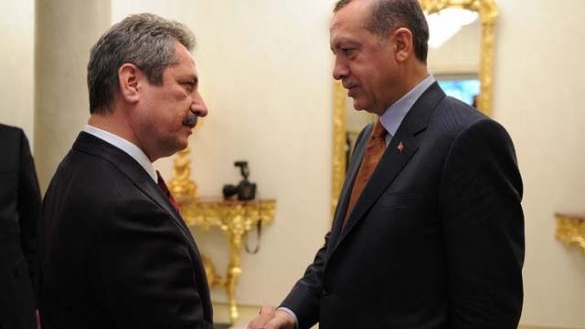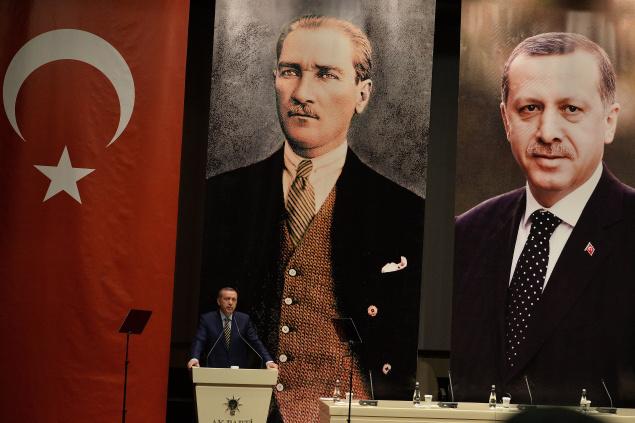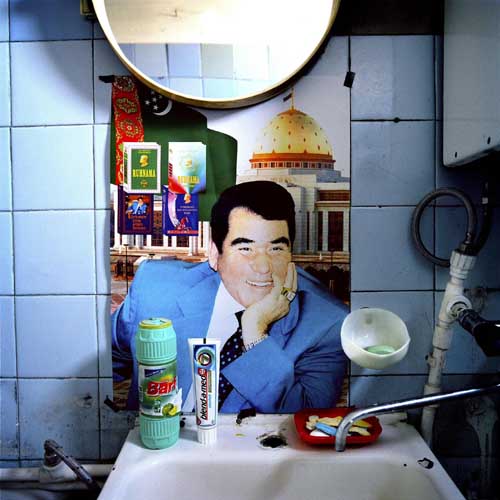The Turkish Prime Minister’s son-in-law is the CEO of a company that has enjoyed a cozy relationship with eccentric dictators in Central Asia and some of the most powerful leaders in the Balkans. The wedding of Esra Erdogan and Berat Albayrak was designed to showcase Turkey as the “bridge between the West and the Islamic world”. Though the hijab was still banned in public institutions, and scorned by Istanbul’s secular elite, the bride wore a white headscarf draped in translucent jewels. About 7,000 guests flew in from various points around the globe to attend the extravagant event, which was held inside the same Istanbul convention center where the heavily protested 2004 NATO summit had taken place just a few days earlier.
Security surrounding the high-profile nuptials was kept deliberately tight, with some 5,000 police officers dispatched to patrol the streets, and snipers assigned to rooftop positions across the city. Safety measures alone reportedly cost 50 billion Turkish lira.
The ceremony’s four official witnesses were all foreign dignitaries: King Abdullah II of Jordan, former Pakistani President General Pervez Musharraf, and the prime ministers of Greece and Romania.
Silvio Berlusconi was unable to attend, but sent his regrets along with a Versace vase.

The choice to include two Muslims and two Orthodox Christians in the marital rites was a deliberate one. Prime Minister Recep Tayyip Erdogan had only been in office for about four months at the time, and was eager to use his daughter’s vows to remind the world about Turkey’s historical prominence in the region. Of course, this was when Erdogan was eager to join the EU, and still cared about his standing with the “international community”. He even arranged to have a film crew from CNN Turk broadcast the entire wedding on live television.
Ahmet Calik, one of the richest men in Turkey, stood beside Erdogan for the duration of the ceremony.
The baby-faced groom was Berat Albayrak, a recent graduate of New York’s Pace University and the son of a conservative journalist who had been a close friend of Erdogan’s since 1980. Though Berat was just 23 years old when he married the prime minister’s eldest daughter, he was fast-tracked to a prestigious position with Ahmet Calik’s powerful Turkish conglomerate Calik Holding, which has extensive investments in the Balkans and Central Asia. Within a few years, he was its CEO.

“We will wipe out Twitter,” Erdogan promised at a recent campaign rally in the industrial city of Bursa. “I don’t care what the international community says. They will see the Turkish republic’s strength.”
The Twitter blackout was reportedly a response to rumors that audio recordings linking Erdogan to alleged corruption had surfaced on the site. It was the latest episode in a sordid corruption scandal that has dominated Turkey since dawn broke on December 17.
This winter, key cabinet ministers resigned, and their adult children were taken into police custody. Numerous members of the prime minister’s ruling Justice and Development Party (AKP) were arrested, along with the head of the state-owned financial institution Halkbank. Police were said to have found shoe boxes stuffed with $4.5 million in cash inside the bank director’s home. Soon a grainy VHS-quality sex tape started circulating online, which appeared to star the pious prime minister’s businessman brother, Mustafa Erdogan, engaged in an act of adultery.
Erdogan’s response has been characteristically defiant. He’s fought back by attacking the internet and purging the police force of thousands of officers. The prime minister maintains that he’s only trying to protect the country from another coup. (Turkey has endured four in recent memory: in 1960, 1971, 1980, and 1997). For now, it seems Erdogan has emerged victorious.

The prime minister and others in his orbit say members of a secretive Islamic religious order known as the Gulen movement have methodically infiltrated Turkey’s judiciary and police force as part of a plan to overthrow Erdogan from the inside, and the government and the cemaat (religious movement) have been engaged in a very public media war for months.
Fethullah Gulen is an enigmatic diabetic who has lived in self-imposed exile in rural Pennsylvania since 1999. In a Foreign Policy poll conducted in 2008, he was voted “the most influential intellectual in the world”.
But Erdogan’s AKP scored a significant victory in Sunday’s nationwide local elections, which seems to indicate that Gulen’s allegations of widespread graft have done little to dent the prime minister’s popularity with much of the electorate.
It’s easy to see how Gulen may have overestimated the persuasive powers of his own influence: His disciples have opened some 1,000 schools in over 140 different countries, and established media outlets, including Zaman — the newspaper with the widest circulation in Turkey.
Until relatively recently, the Gulenists were the AKP’s allies in the fight to challenge Turkey’s state-sponsored secularism and powerful army. In Gulen: The Ambiguous Politics of Market Islam, which was released in August, Joshua D. Hendrick described the Gulen movement as the AKP’s “most important collective partner”. Little has been said about how the Gulen movement, which followers call Hizmet or service, may have benefited from a decade spent collaborating with Erdogan’s government. Hendrick notes that Gulen-affiliated institutions “received favors” from AKP bureaucrats, and that companies operated by Gulen’s followers “received tenders with the help of AKP policies”.
Many ethically questionable activities involving both Calik Holdings — the company headed by Erdogan’s son-in-law — and the Gulen movement extend far beyond Turkey’s contemporary borders, because Erdogan and Gulen share something else: a belief that modern Turkey is the continuation of the Ottoman Empire and the center of a collective civilization that stretches from Central Asia all the way to the Balkans.

All the while, human rights were non-existent; torture, imprisonment and forced psychiatric treatment were used to keep dissidents in line; and the country was one of the most repressive in the world. Ahmet Calik, who made Erdogan’s son-in-law his CEO, was the dictator’s closest advisor and confidante.

Calik is a native son of Malatya, one of the fast-growing Anatolian Tiger cities credited with driving the Turkish economy. A middle-aged man with a well-trimmed mustache and an affinity for silk ties, Calik has been called the Gulen movement’s “star entrepreneur”. In US diplomatic cables, he’s also been described as “close to AKP and the prime minister himself”. As of last year, he had an estimated net worth of $1.7 billion.
He also had a knack for exploiting Niyazov’s delusions of grandeur for his own financial gain.
President Niyazov wrote a semi-autobiographical “holy book” called the Ruhnama in 2001 that schoolchildren were forced to memorize, and which eventually supplanted normal education in Turkmenistan altogether.
“I sacrifice my life and my flesh to you; if I do the slightest harm to you, let my tongue dry and fall off like a leaf,” a group of Turkmen schoolchildren recite from the Ruhnama in one unsettling scene from Arto Halonen’s 2007 documentary, The Shadow of the Holy Book.
There’s a massive, mechanized statue of the Ruhnama towering over the capital city of Ashgabat — a birthday gift to the dictator from Ahmet Calik. Every night at exactly 8 pm, the cover of the book opens and an audio recording blares the Ruhnama’s verses, while a colorful video of Turkmenbashi’s face is projected onto an enormous blank page.
Calik was the first foreign businessman to understand that translating the Ruhnama into a new language was the most effective means of obtaining lucrative business contracts in Turkmenistan. Hendrick claims that a “senior-level aristocrat” in the Gulen movement’s hierarchy prepared a Turkish translation of the so-called “Book of the Soul”, which Calik then presented to Turkmenbashi at an official ceremony.

Niyazov famously renamed the months of the year after members of his own family, but few know this was actually Calik’s idea. The eccentric cruelties of his dictatorship were seemingly infinite:
He used the enormous wealth generated by Turkmenistan’s production of 70 billion cubic meters of natural gas each year to experiment with the limits of his country’s extreme climate. He demanded that an ice palace be built in the middle of the Karakum desert — the hottest place in Central Asia. Though summer temperatures in the area often exceed 50 degrees celsius (about 122 degrees fahrenheit), he also insisted that desert ice park include a flock of penguins. (A U.S. diplomatic cable says Calik’s company built the ice palace).
An International Crisis Group report on Turkmenistan for the year 2004 mentions Calik’s name numerous times. He was and remains the biggest foreign investor in Turkmenistan.
Calik’s own operations in the country have included textile factories that produce denim for H&M, Levi’s, and Calvin Klein using child labor, and a number of outlandish construction projects in Ashgabat, including the Great Saparmurat Turkmenbashi Cultural Center, and the Independence monument, which looks like a gilded missile.
Calik is suspected of “financial machinations” and “abuse of his access to Turkmenbashi”. He was granted full Turkmen citizenship in the 1990s, and served as Minister of Textiles. Turkmen opposition leaders often complained that Calik exercised an “unhealthy” level of control over Turkmenistan’s internal affairs.

In addition, Calik supported the publication and distribution of a new Turkmen-language version of Zaman, the Gulen-affiliated newspaper. Soon, there were local editions of Zaman being published in the Central Asian capitals of Kazakhstan, Uzbekistan, and Kyrgyzstan.
Then in 2003, Niyazov abruptly announced that Russian should no longer be a language of instruction in schools. By the end of Niyazov’s life, only one Russian-language school remained, and the country’s only French and German schools were also closed. “The Turkmen government virtually prohibited internationally sponsored curricular reform altogether,” Erika Dailey and Iveta Silova, two prominent researchers on Central Asia, wrote.
But Turkish schools, operated by members of the Gulen movement, managed to thrive under the oppressive and bizarre dictatorship. In fact, there were 16 Gulen-affiliated “Turkmen-Turkish” schools scattered across Turkmenistan by the start of the 2006-2007 school year.
Most agree that “Gulen-affiliated” Turkish schools blossomed under Niyazov’s repressive dictatorship due in large part to Ahmet Calik. “The Gulen community is very active in Turkmenistan because its members served as advisors to President Niyazov himself (the adviser on energy issues and the deputy minister of textiles, Ahmet Calik),” Dailey and Silova explained. “In addition, the Gulen community is known for its supportive attitude toward the authoritarian government of Turkmenistan.”
Parents needed to pay high fees to send their children to the schools, meaning Gulenist institutions, spread throughout post-Soviet Central Asia in the name of “Turkic brotherhood”, largely served the elite. The annual tuition for a spot at a Gulen-affiliated school in Turkmenistan was roughly $1,000 in the early 2000s, while GDP per capita was only about $5,000.
Turkmenbashi dropped dead of myocardial infarction in December 2006, leaving control of the country to his dentist, Gurbanguly Berdymukhamedov. This successor and strange Niyazov doppelganger made Calik uneasy about the security of his own business dealings in Turkmenistan, even though the two had lived as neighbors in the same Ashgabat highrise built by Calik’s own construction firm for years. According to diplomatic cables, Calik had an emotional four-hour dinner in Istanbul with American Chargé d’affaires Richard Hoagland in September 2007 during which he lamented that the late Turkmenbashi had “treated him like a son”.

